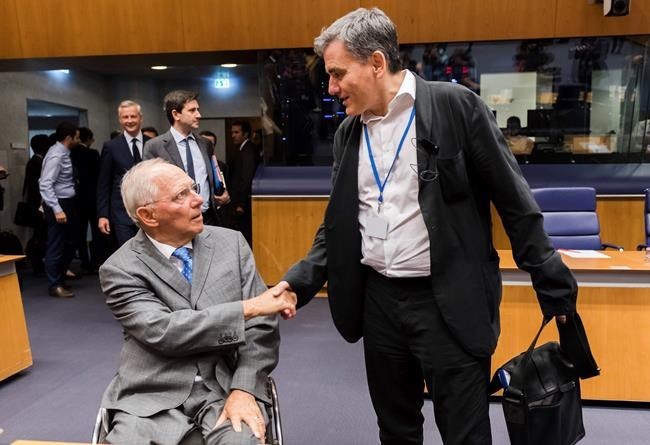
FILE - In this June 15, 2017 file photo, German Finance Minister Wolfgang Schaeuble, left, shakes hands with Greek Finance Minister Euclid Tsakalotos during a meeting of eurogroup finance ministers at the European Council building in Luxembourg. Wolfgang Schaeuble, the long-time German finance minister, is attending his final meeting of his peers in the 19-country eurozone on Monday, Oct. 9, 2017. (AP Photo/Geert Vanden Wijngaert, File)
Republished October 09, 2017 - 12:15 PM
Original Publication Date October 09, 2017 - 9:06 AM
BRUSSELS - German Finance Minister Wolfgang Schaeuble, who championed austerity as the only way countries like Greece could avoid bankruptcy and continue to use the euro currency, is winning plaudits at his final meeting with European peers.
Schaeuble, a close ally of Chancellor Angela Merkel, has been a controversial figure at the eurogroup meetings over the past few years, not least because of his insistence that countries requiring financial bailouts had to implement tough austerity measures, such as big spending cuts and tax increases, in return for the money.
His supporters, mainly in northern Europe, argue that Schaeuble's approach helped stabilize the euro currency in what was its biggest crisis since its launch in 1999. They note that no country has ditched the euro and of the bailed-out countries, all but Greece are standing on their own two feet. Even Greece, with its annual budget in much better shape is due to exit its bailout era next year.
Schaeuble's critics though have accused him of being cold-hearted and impervious to the damage wrought to vast sections of society from the austerity prescribed. In return for the hundreds of billions of euros that allowed the bailed-out countries — Greece, Ireland, Portugal and Cyprus — to meet their debt obligations, governments have had to undertake wide-ranging reforms to their economies as well as pursuing strict budgetary constraint. In Greece, the austerity has been widely blamed for a deep recession that saw the Greek economy lose a quarter of its output, and unemployment and poverty levels rise markedly.
"Eight years is enough," said Schaeuble as he entered the eurogroup meeting of the bloc's 19 finance ministers in Luxembourg. "In a tough time, we kept the euro stable."
Since the euro's launch, Germany has always been the most-important member of the single currency bloc, both because of the size of its economy but also because of its well-earned reputation for financial stability over many decades. Under Schaeuble, the country's power became even more pronounced, particularly with regard to Greece after its debt crisis exploded in the autumn of 2009. In 2015, Greece came close to going bankrupt before the left-wing Greek government under new Prime Minister Alexis Tsipras relented and accepted the country's third international bailout on similar terms to the previous two.
"He played a crucial role," said Jeroen Dijsselbloem, the top official in the 19-country eurozone. "He will be missed," Dijsselbloem said, before adding "his sternness sometimes." He also said Schaeuble was known for his advice "sometimes asked, sometimes unasked, but always welcome."
Spain, which saw some of its banks bailed out during the crisis, had warm words, too.
"At the end of the day, he only looked to the best for the whole of the eurozone," said Finance Minister Luis de Guindos.
___
Dave McHugh contributed from Frankfurt.
News from © The Associated Press, 2017